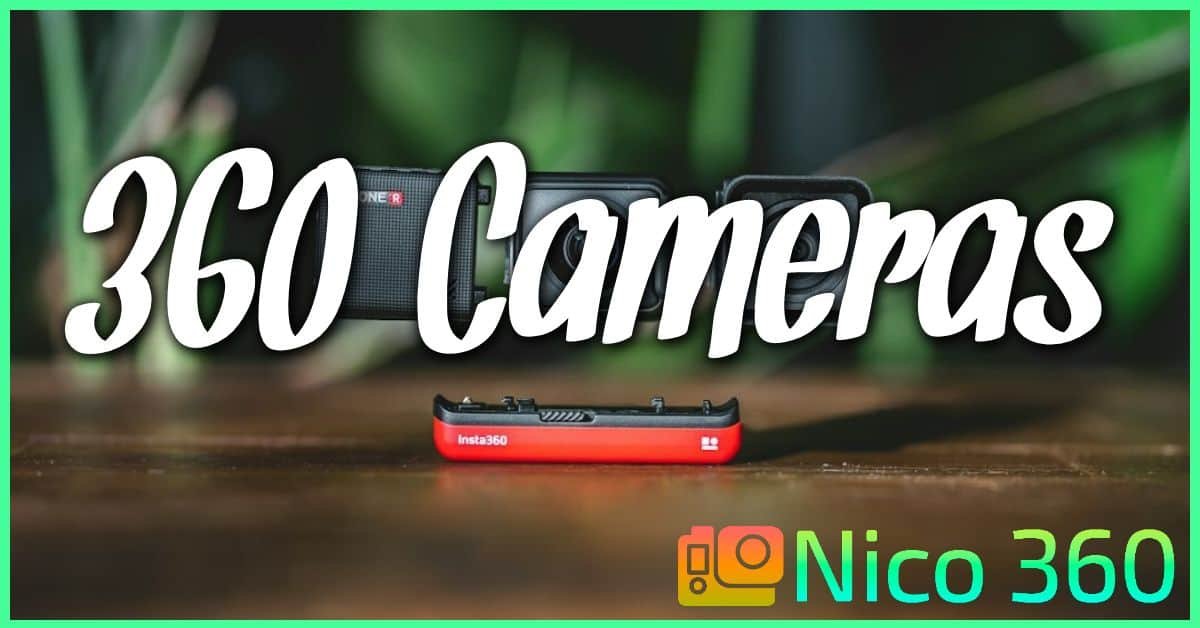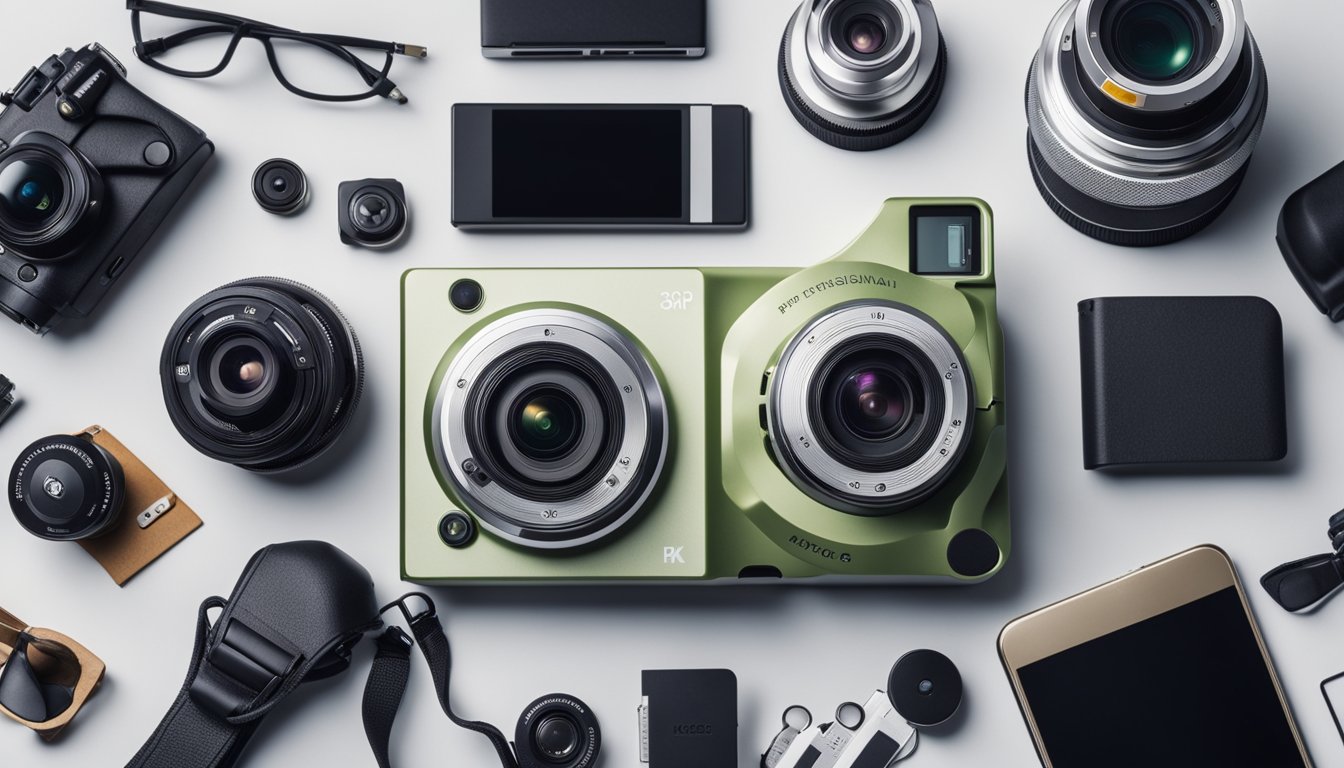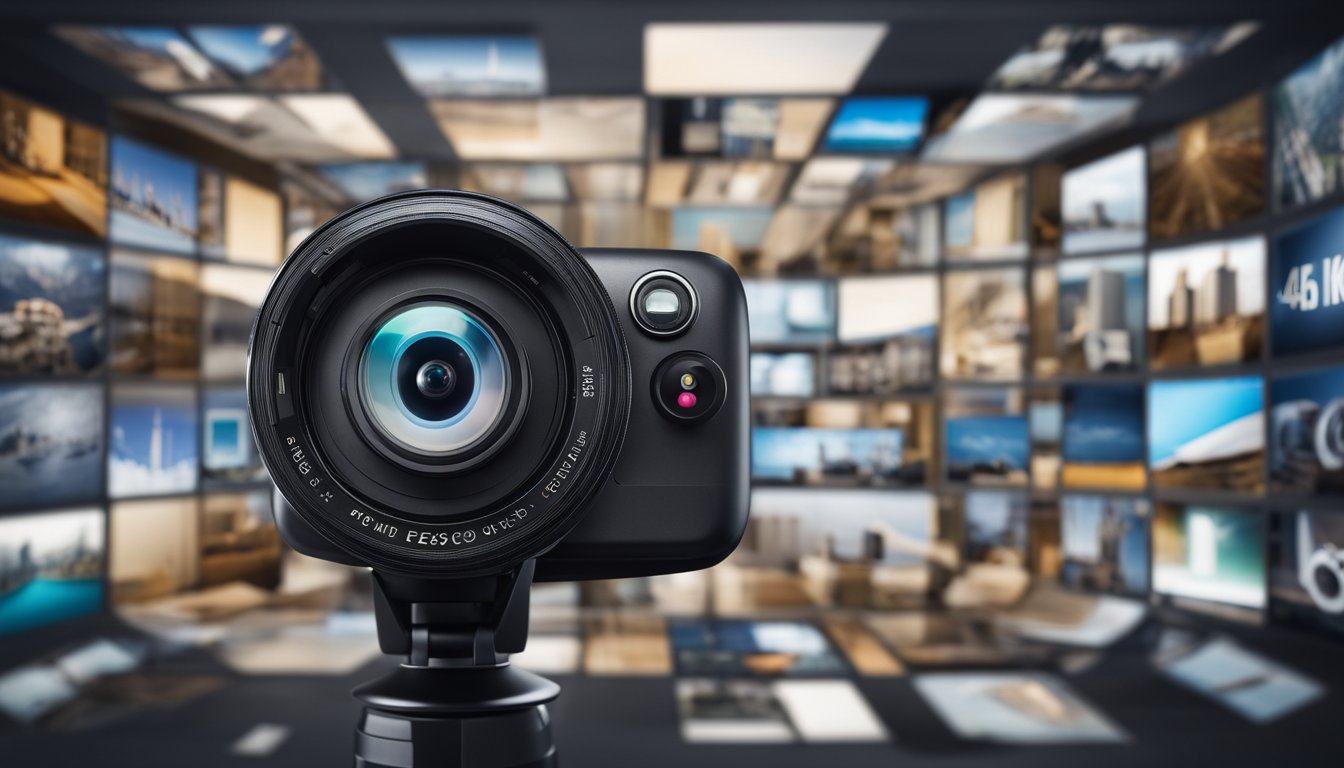If you’re looking for a new business venture, 360 cameras may be just the thing for you. These cameras capture immersive, 360-degree footage and have numerous applications across a variety of industries. From virtual tours to real estate marketing, 360 cameras are becoming increasingly popular for their ability to create engaging and interactive content.
Starting a 360 camera business can be a lucrative opportunity for entrepreneurs who are willing to put in the work. However, it’s important to understand the market and the potential challenges you may face. In this article, we’ll explore some of the key considerations for starting a 360 camera business, including market analysis, sales and distribution, marketing, and more. Whether you’re a seasoned entrepreneur or just starting out, this guide will provide you with the information you need to succeed in the 360 camera industry.
Key Takeaways
- 360 cameras have numerous applications across a variety of industries.
- Starting a 360 camera business can be a lucrative opportunity, but it’s important to understand the market and potential challenges.
- Key considerations for starting a 360 camera business include market analysis, sales and distribution, marketing, and more.
Understanding 360-Degree Cameras
https://www.youtube.com/watch?v=_5qihtKNDiU&embed=true
If you’re interested in starting a 360 camera business, it’s important to understand the basics of 360-degree cameras. These cameras capture a full 360-degree view of the surrounding environment, allowing viewers to pan and zoom in any direction. In this section, we’ll explore the evolution of 360-degree cameras and the key features that make them unique.
Evolution of 360-Degree Cameras
360-degree cameras have come a long way since their inception. In the past, capturing a 360-degree view required using multiple cameras and stitching the images together. However, with advancements in technology, 360 cameras are now compact and can capture a seamless 360-degree view with just one lens.
The first 360-degree camera was introduced in 1995 by Apple. However, it wasn’t until 2013 that the first consumer-grade 360 camera was released by Ricoh. Since then, companies like Insta360, Nikon, and Samsung have released their own 360 cameras, making the technology more accessible to the general public.

Key Features of 360 Cameras
One of the key features of 360 cameras is their ability to capture a full 360-degree view. This allows viewers to immerse themselves in the environment and explore it from any angle. Additionally, many 360 cameras come equipped with features like image stabilization, live streaming capabilities, and high-resolution recording.
Another important feature of 360 cameras is their compatibility with virtual reality (VR) technology. With a VR headset, viewers can feel like they are actually in the environment, making it an ideal tool for gaming, real estate, and tourism industries.
In conclusion, understanding the basics of 360-degree cameras is crucial if you’re interested in starting a 360 camera business. With the evolution of technology and key features like full 360-degree view and VR compatibility, 360 cameras are becoming more popular and accessible to the general public.
Starting a 360 Camera Business
https://www.youtube.com/watch?v=36Rka_SKwpc&embed=true
If you are interested in starting a 360 camera business, it is important to consider a few key factors to ensure success. In this section, we will discuss business planning and legal considerations.
Business Planning
« 360 Camera with Measurements: The Ultimate Tool for Precise Capturing
Can You Add a 360 Camera to Your F250? »
Before starting a 360 camera business, you should develop a comprehensive business plan. This plan should outline your company’s goals, target market, marketing strategy, and financial projections. Conduct market research to determine the demand for 360 cameras in your area and identify potential competitors. Consider offering unique services or products that differentiate your business from others in the market.
It is also important to determine your pricing strategy. Research the prices of similar products and services in your area and set competitive prices. Consider offering package deals or discounts to attract customers.
Legal Considerations
Starting a small business requires complying with legal requirements. You will need to register your business with the appropriate government agencies and obtain any necessary licenses and permits. Consult with a lawyer to ensure that you are following all legal requirements and protecting your business.
You should also consider obtaining liability insurance to protect your business from potential lawsuits. This insurance can cover damages caused by your products or services.
In conclusion, starting a 360 camera business can be a lucrative business idea. However, it is important to develop a comprehensive business plan and comply with all legal requirements to ensure success.
Market Analysis
When starting a 360 camera business, understanding the market is essential for success. In this section, we will cover two important aspects of market analysis: identifying your target audience and analyzing the competitive landscape.
Target Audience Identification
To effectively market your 360 camera business, you need to identify your target audience. The global 360-degree camera market is rapidly expanding, with a compound annual growth rate of 23.94% from 2023 to 2032. This means that there is a growing demand for 360 cameras, and you need to identify the specific audience you want to target.
Some potential target audiences for your 360 camera business might include:
- Professional photographers and videographers
- Tourist attractions and theme parks
- Real estate agents and property management companies
- Event planners and coordinators
- Social media influencers and content creators
Once you have identified your target audience, you can tailor your marketing efforts to reach them effectively.
Competitive Landscape
The 360 camera market is becoming increasingly competitive, with major players like Samsung and Nikon leading the charge. To succeed in this market, you need to analyze the competitive landscape and find ways to differentiate yourself from the competition.
Some ways to differentiate your 360 camera business might include:
- Offering unique features and capabilities that the competition does not have
- Focusing on a specific niche or market segment that the competition is not targeting
- Providing exceptional customer service and support
- Offering competitive pricing and promotions
By analyzing the competitive landscape and finding ways to differentiate yourself, you can position your 360 camera business for success in a rapidly growing market.
360 Camera Sales and Distribution
https://www.youtube.com/watch?v=Eb7ZeDyEffA&embed=true
If you’re looking to start a 360 camera business, it’s important to consider how you’ll sell and distribute your products. In this section, we’ll discuss two key strategies for selling and distributing 360 cameras: online sales and retail partnerships.
Online Sales Strategies
One of the most effective ways to sell 360 cameras is through online channels. Online sales allow you to reach a wide audience and can be a cost-effective way to increase sales and revenue streams. Here are a few online sales strategies to consider:
- Affiliate marketing: Partner with bloggers, influencers, and other websites to promote your 360 cameras. Offer them a commission for every sale they generate.
- Social media marketing: Use social media platforms like Instagram, Facebook, and Twitter to promote your 360 cameras. Share high-quality photos and videos captured with your cameras to showcase their capabilities.
- Search engine optimization (SEO): Optimize your website and product pages for search engines like Google. Use keywords related to 360 cameras to increase your visibility in search results.
Retail Partnerships
In addition to online sales, retail partnerships can be an effective way to distribute your 360 cameras. Retail partnerships allow you to reach customers who prefer to shop in-store or who may not be aware of your brand. Here are a few retail partnership strategies to consider:
- Big box retailers: Partner with big box retailers like Best Buy or Walmart to sell your 360 cameras. This can be a great way to reach a wide audience and increase sales.
- Specialty retailers: Partner with specialty retailers that cater to photography or technology enthusiasts. These retailers may be more likely to carry your 360 cameras and provide knowledgeable sales staff to help customers make informed decisions.
Overall, a combination of online sales and retail partnerships can be an effective way to sell and distribute your 360 cameras. Consider your target audience and budget when deciding which strategies to pursue.
Marketing Your 360 Camera Business
https://www.youtube.com/watch?v=GXMqBosFGoQ&embed=true
Marketing your 360 camera business is essential to attract customers and grow your business. In this section, we will discuss some effective marketing strategies to help you promote your 360 camera business.
Content Marketing
Content marketing is a great way to attract potential customers to your 360 camera business. You can create blog posts, videos, and other types of content that showcase the capabilities of your 360 camera. For example, you can create a video that shows how your 360 camera can be used to create virtual tours of real estate properties. You can also write blog posts that provide tips on how to use a 360 camera effectively.
When creating content, make sure that it is informative, engaging, and relevant to your target audience. You can also include calls-to-action in your content to encourage viewers to visit your website or contact you for more information.
Social Media and Email Campaigns
Social media and email campaigns are effective ways to reach potential customers and promote your 360 camera business. You can create social media profiles on platforms like Facebook and Instagram and share your content with your followers. You can also run targeted ads on social media to reach a wider audience.
Email campaigns are another effective way to promote your 360 camera business. You can send newsletters to your subscribers that provide updates on your products and services. You can also include special offers and promotions to encourage customers to purchase your products.
When running social media and email campaigns, make sure that your messaging is consistent and in line with your brand. You can also use analytics to track the performance of your campaigns and make adjustments as needed.
By using these marketing strategies, you can effectively promote your 360 camera business and attract more customers.
Creating Engaging 360 Content
https://www.youtube.com/watch?v=DTjK2XdV89g&embed=true
As a 360 camera business owner, it’s crucial to create engaging and high-quality content to attract potential clients. Here are some tips on how to create captivating 360 content:
360 Photography Tips
When it comes to 360 photography, there are a few things to keep in mind to capture the perfect panoramic shot. First, make sure your camera is level and stable to avoid any distortion in the final image. Use a tripod or a stable surface to keep the camera steady.
Another essential tip is to ensure proper lighting. Use natural light whenever possible, and avoid shooting in low-light conditions. If you need to use artificial light, make sure it’s evenly distributed to avoid any harsh shadows.
Lastly, make sure to experiment with different angles and perspectives to create unique and interesting shots. Don’t be afraid to get creative and try new things.
Crafting Interactive 360 Videos
Creating interactive 360 videos is a great way to showcase your clients’ businesses and products. To create a compelling 360 video, you need to think about the user experience. Your video should be engaging and interactive, allowing viewers to explore the scene and interact with different elements.
One way to do this is to add hotspots to your video. Hotspots are clickable areas that allow viewers to interact with different elements in the video, such as product information, links to websites, or social media pages.
Another tip is to use high-quality sound to enhance the immersive experience. Use a microphone to capture clear audio, and consider adding background music to set the mood.
Lastly, make sure to keep your video short and sweet. Viewers have short attention spans, so keep your video under two minutes to ensure maximum engagement.
By following these tips, you can create engaging and high-quality 360 content that will attract potential clients to your business.
Innovative 360 Camera Applications
https://www.youtube.com/watch?v=DXyw_Kp0gAw&embed=true
If you’re thinking about starting a 360 camera business, you might be wondering what kind of applications are available for this technology. Here are a few innovative ideas to get you started:
Virtual Tours for Real Estate
Real estate agents can use 360 cameras to create virtual tours of properties. This allows potential buyers to get a feel for the space without having to physically visit the property. With the COVID-19 pandemic forcing many people to stay at home, virtual tours have become an increasingly popular way to view properties. According to Stitcher, virtual tours can increase the number of leads by up to 50% and decrease the time a property stays on the market by up to 31%.
Live Events Coverage
360 cameras can also be used to cover live events. By livestreaming the event in 360, viewers can feel like they’re actually there. This is especially useful for events that are difficult to attend in person, such as music festivals or sporting events. According to Eventbrite, 360 video can increase engagement by up to 300% compared to traditional video.
Overall, 360 cameras have a wide range of applications, from virtual tours to live events coverage. By using this technology, you can provide your clients with a unique and immersive experience that they won’t forget.
Networking and Community Building
As a 360 camera business owner, networking and community building are crucial for your success. By building relationships with industry professionals and clients, you can gain valuable insights and referrals that can help grow your business. Here are some tips to help you leverage networking and community building to your advantage.
Leveraging Industry Events
Attending industry events such as trade shows, conferences, and meetups can be a great way to network with other professionals in the industry. These events offer opportunities to meet potential clients, learn about new technologies, and build relationships with other businesses.
When attending these events, be sure to bring plenty of business cards and promotional materials to hand out. You should also come prepared with a clear elevator pitch that explains what your business does and how it can benefit potential clients.
Building Word of Mouth
Word of mouth is one of the most powerful marketing tools for any business, and it can be especially effective for a 360 camera business. By providing high-quality products and services, you can build a loyal customer base that will be eager to refer others to your business.
To encourage word of mouth referrals, consider offering incentives such as discounts or free services to customers who refer new clients to your business. You can also ask satisfied customers to leave reviews on your website or social media pages, which can help attract new clients.
By leveraging industry events and building word of mouth referrals, you can establish a strong network and community for your 360 camera business. These relationships can help you gain valuable insights, expand your customer base, and ultimately grow your business.
Leveraging Technology for Growth
https://www.youtube.com/watch?v=DExnRT4P8Qc&embed=true
As a 360 camera business owner, you can leverage technology to grow your business. Two ways to do this are through Augmented and Virtual Reality and Integration with Platforms like Google Street View.
Augmented and Virtual Reality
Augmented and Virtual Reality (AR/VR) technology is becoming increasingly popular in the photography industry. AR/VR technology allows users to create immersive experiences that can be used for marketing, education, and entertainment purposes.
As a 360 camera business owner, you can use AR/VR technology to create immersive experiences for your customers. For example, you can create virtual tours of real estate properties, hotels, and resorts. You can also create virtual reality experiences for events like weddings and concerts.
Integration with Platforms like Google Street View
Google Street View is a popular platform that allows users to explore cities and towns around the world. As a 360 camera business owner, you can integrate your cameras with Google Street View to provide users with immersive experiences.
By integrating your cameras with Google Street View, you can help businesses create virtual tours of their locations. For example, a restaurant can create a virtual tour of their dining room, kitchen, and outdoor patio. This can help potential customers get a feel for the restaurant before they visit.
One camera that is great for integrating with Google Street View is the Insta360 One X. This camera is easy to use and produces high-quality 360-degree photos and videos. It also comes with software that makes it easy to upload your content to Google Street View.
In conclusion, leveraging technology is a great way to grow your 360 camera business. By using AR/VR technology and integrating with platforms like Google Street View, you can provide your customers with immersive experiences that will keep them coming back for more.
Equipment and Accessories
When it comes to starting a 360 camera business, choosing the right equipment and accessories is crucial. Not only will it affect the quality of your output, but it can also impact your workflow and efficiency. In this section, we will discuss some important factors to consider when selecting equipment and accessories for your 360 camera business.
Choosing the Right Tripod and Accessories
One of the most important pieces of equipment for any 360 camera setup is the tripod. A sturdy tripod is essential for keeping your camera steady and ensuring smooth, stable footage. When choosing a tripod, look for one that is lightweight, durable, and easy to set up. You may also want to consider a tripod with adjustable legs that can be positioned at different angles to accommodate uneven terrain.
In addition to a tripod, there are several other accessories that can help you get the most out of your 360 camera. For example, a remote shutter release can be useful for triggering the camera without jostling it. A leveling base can help ensure that your camera is perfectly level, which is important for creating seamless 360 panoramas. And a carrying case can help protect your equipment when you’re on the go.
Maintenance and Upkeep
Proper maintenance and upkeep of your 360 camera equipment is essential for ensuring that it stays in good working order. Regular cleaning and inspection can help prevent dust and debris from accumulating on your lenses or inside your camera. You should also be sure to keep your equipment stored in a dry, cool place when not in use.
If you’re using a Ricoh Theta camera, be sure to check for firmware updates regularly. These updates can add new features and improve the performance of your camera. You should also consider investing in a spare battery or two so that you can keep shooting even when your primary battery runs out of juice.
Overall, choosing the right equipment and accessories and taking care of them properly is essential for running a successful 360 camera business. By following these tips and investing in quality gear, you can ensure that your output is top-notch and your workflow is efficient.
Expanding Your Business Venture
Once you have established your 360 camera business, it’s time to think about expanding your business venture. Here are some ideas to help you grow your business:
Exploring New Markets
One way to expand your business is to explore new markets. For example, you could target the street view business market. With the rise of virtual tours and interactive entertainment, there is a growing demand for businesses that can provide high-quality 360-degree images for use in these applications. By positioning your business as an expert in this field, you can tap into a lucrative new market.
Another option is to target the nature market. Nature enthusiasts are always looking for new ways to capture the beauty of the great outdoors. By offering 360-degree cameras and accessories that are specifically designed for outdoor use, you can appeal to this market and differentiate your business from competitors.
Diversification of Services
Another way to expand your business is to diversify your services. For example, you could offer a range of different 360-degree cameras and accessories to cater to different customer needs. This will allow you to appeal to a wider range of customers and increase your revenue streams.
You could also consider offering additional services, such as 360-degree video editing or virtual tour creation. By offering these services, you can provide a one-stop-shop for customers who are looking for a complete 360-degree solution.
In conclusion, there are many ways to expand your 360 camera business venture. Whether you’re exploring new markets or diversifying your services, the key is to stay focused on your customers and their needs. By doing so, you can continue to grow your business and stay ahead of the competition.
Frequently Asked Questions
What are some innovative business ventures utilizing 360-degree cameras?
360-degree cameras have opened up a world of possibilities for businesses. Some innovative business ventures utilizing 360-degree cameras include virtual tours, immersive marketing campaigns, and real estate photography. With virtual tours, businesses can give customers an immersive experience of their products or services. Immersive marketing campaigns, on the other hand, involve creating interactive and engaging content that can be shared on social media platforms. Real estate photography is another area where 360-degree cameras are being used to create immersive experiences for potential buyers.
How is the 360-degree camera market performing, and what are its growth prospects?
The 360-degree camera market has been growing steadily in recent years. According to a report by MarketsandMarkets, the global 360-degree camera market is expected to grow from USD 1.4 billion in 2020 to USD 2.6 billion by 2025, at a CAGR of 13.2% during the forecast period. The growth of the market can be attributed to the increasing demand for virtual reality content, the growing popularity of social media platforms, and the increasing adoption of 360-degree cameras in various industries.
What are the initial costs involved in starting a business focused on 360-degree photography?
The initial costs involved in starting a business focused on 360-degree photography can vary depending on the type of business and the equipment needed. For example, if you are starting a virtual tour business, you will need to invest in a 360-degree camera, a tripod, and a virtual tour software. The cost of a 360-degree camera can range from a few hundred dollars to several thousand dollars depending on the features and specifications. However, there are also affordable options available for those who are just starting out.
What unique services can be offered to customers with 360-degree cameras?
360-degree cameras offer a wide range of possibilities for businesses to offer unique services to their customers. Some of the services that can be offered include virtual tours, immersive marketing campaigns, and real estate photography. Virtual tours can be used to give customers an immersive experience of a product or service. Immersive marketing campaigns can be used to create interactive and engaging content that can be shared on social media platforms. Real estate photography can be used to create immersive experiences for potential buyers.
How can real estate businesses benefit from incorporating 360-degree cameras?
Real estate businesses can benefit greatly from incorporating 360-degree cameras into their marketing strategy. 360-degree cameras can be used to create virtual tours of properties, allowing potential buyers to view properties from the comfort of their own homes. This can save time and money for both the buyer and the seller. Additionally, 360-degree cameras can be used to create immersive experiences for potential buyers, helping them to visualize themselves in the property.
What are the key factors to consider when creating virtual tours for clients using 360 cameras?
When creating virtual tours for clients using 360 cameras, there are several key factors to consider. Firstly, it is important to choose the right equipment, including the camera and tripod. Secondly, it is important to choose the right virtual tour software, which should be easy to use and provide a range of features. Thirdly, it is important to plan the virtual tour carefully, including the sequence of shots and the narration. Finally, it is important to optimize the virtual tour for different devices and platforms, including desktops, smartphones, and VR headsets.












